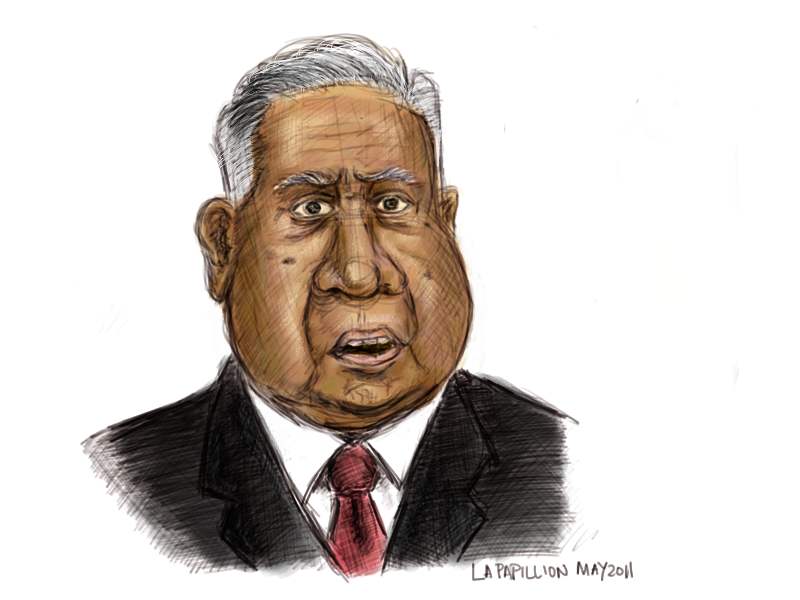Just by looking through the cbox history, one can learn a lot of lessons from the actions (or sometimes the non-action) of people. I'll just list them out objectively, not to ridicule but rather to reinforce the lessons in me again. I must have done it many times in the past, but hopefully not ever again.
1. Buyer's remorse (or seller's remorse)
This is when the queue that you had put in place had been hit, but instead of having feelings of joy and jubilation, you are feeling unhappy because you now really own the shares at the price. This is actually quite similar to seller's remorse, where you sold at a certain price but again instead of feeling happy, you actually regret selling at the price. These are just basic emotions of greed and fear at work. For buyer's remorse, it's the fear that after you key in a (hopefully) cheap price, the price will tank further. For seller's remorse, it's the greed that makes you want to earn more after seeing the stock rise up higher than the price you just sold.
Do I have this kind of remorse? Of course I do. It's hard to eradicate it, so it's better to think of ways to manage it. First of all, you really have to want the shares you want at that price. Only after the intent is clear will I queue for it. I don't queue for 'fun' because if the queue is really hit, it's not very funny. As for seller's remorse, I think setting a specific target price and sticking to it (and really, be content with it) is the key. Of course, selling slowly in batches is also a good way to alleviate that emotion if you have more lots - sometime like averaging up your selling price.
These days, after I sell it, I no longer look at it until perhaps a few weeks later. This is more as a post action review on how I can perfect my exit technique rather than to see if I had lost out on any potential future gains.
2. NATO (no action talk only)
I think to make money in the market, it's better to do more action rather than talking about it. Talking (to the right people) will help you understand certain aspects of your intention but beyond that, when it comes to pulling the trigger, you're all on your own. If you do not exercise your own judgement, it's really hard to pull the trigger. When the market is up, you'll be hesitant to buy because you think you can get a cheaper price. When the market is down, you'll be hesitant to buy because you're afraid it'll go down lower. So pray tell, when is the best time to buy? Perhaps talking about it will dissuade you from really doing something about it.
It might be easier if you have conviction behind your buying/selling thesis. There's a reason why people do fundamental analysis and technical analysis - the reason is to discover the value of the underlying stock. 'Discover' is used with deliberation, because I really think that's the way it is. You go around exploring, finding out a range in which the current valuation of the stock is, and you go and make your decision based on that conviction. For those without proper understanding of FA or TA, or those without strong conviction, I think the chances of NATO-ing is pretty high.
3. Too emotional over noise
I hate being manipulated like a ragdoll toy by market physics. It's something that I felt intensely when I was gambling with HSI warrants in the earlier part of my stock market journey and later on during the index futures phase. As I reflected on these emotional roller coasters, I realised that the only thing that make me emotional over such price fluctuations actually stems from money management, rather the lack of it.
If I've 50k and I put 40k into a counter, making it 80% of my entire portfolio, how can I not be emotional? If I earn 60k in a year and I put 40k into a single counter, how can I not be emotional? On the other hand, if I've 100k and I put 10k into a counter, making it 10% of my entire portfolio, would I be bothered if the price tanked? If I earn 150k in a year and I put 10k into a single counter, would I similarly be bothered by market fluctuations?
Feel free to change the percentages to suit your individual requirements - it's the idea that matters.
4. No exit strategy
Most books that I read about stock market focuses solely on how to buy correctly. Seldom do I find one that talks about exiting. I believe that even if you want to keep a stock for long periods of time, there is still a need to get in and out at opportune times to get the best out of the investment. It's best to look at different scenarios before you buy in so that you have a impartial view of the situation. Just by asking yourself questions starting with 'what if', you can clarify your thought process. It's important to have a clear strategy, be it based on specific target price or a particular value thesis, because it allows you to act when the time comes and not freeze like a animal looking straight at the headlights of an incoming car. Think about the cut loss levels (if you have one) and the % returns that you are after before buying it. If you think it can reach the % returns that you are after, then go for it. No point hoping and waiting for a miracle in a stock that just cannot move so much in the timeframe of investing.
5. Improper money management
I think this can be a post by itself because there are just so many points to talk about. I'll just talk about a few pertinent points.
a. Limit your counter to a certain percentage of your portfolio, even if you think the counter is 'guaranteed' to make money. In the face of unknown probabilities, invest in preparedness.
b. Limit the amount that you can buy in a single transaction according to portfolio size. This means that if you have only 100k of investible cash, you don't whack 50k in one single transaction. This ties in with part (a).
c. Bro8888's advice always ring true - buy and sell slowly
d. If you have a losing streak, stop yourself from buying anymore. Give yourself a time to reflect and gather your thoughts and think about why you are losing money. When starting up again, reduce the amount invested again, only increasing it after you've proven your worth by making a winning trade.
1. Buyer's remorse (or seller's remorse)
This is when the queue that you had put in place had been hit, but instead of having feelings of joy and jubilation, you are feeling unhappy because you now really own the shares at the price. This is actually quite similar to seller's remorse, where you sold at a certain price but again instead of feeling happy, you actually regret selling at the price. These are just basic emotions of greed and fear at work. For buyer's remorse, it's the fear that after you key in a (hopefully) cheap price, the price will tank further. For seller's remorse, it's the greed that makes you want to earn more after seeing the stock rise up higher than the price you just sold.
Do I have this kind of remorse? Of course I do. It's hard to eradicate it, so it's better to think of ways to manage it. First of all, you really have to want the shares you want at that price. Only after the intent is clear will I queue for it. I don't queue for 'fun' because if the queue is really hit, it's not very funny. As for seller's remorse, I think setting a specific target price and sticking to it (and really, be content with it) is the key. Of course, selling slowly in batches is also a good way to alleviate that emotion if you have more lots - sometime like averaging up your selling price.
These days, after I sell it, I no longer look at it until perhaps a few weeks later. This is more as a post action review on how I can perfect my exit technique rather than to see if I had lost out on any potential future gains.
2. NATO (no action talk only)
I think to make money in the market, it's better to do more action rather than talking about it. Talking (to the right people) will help you understand certain aspects of your intention but beyond that, when it comes to pulling the trigger, you're all on your own. If you do not exercise your own judgement, it's really hard to pull the trigger. When the market is up, you'll be hesitant to buy because you think you can get a cheaper price. When the market is down, you'll be hesitant to buy because you're afraid it'll go down lower. So pray tell, when is the best time to buy? Perhaps talking about it will dissuade you from really doing something about it.
It might be easier if you have conviction behind your buying/selling thesis. There's a reason why people do fundamental analysis and technical analysis - the reason is to discover the value of the underlying stock. 'Discover' is used with deliberation, because I really think that's the way it is. You go around exploring, finding out a range in which the current valuation of the stock is, and you go and make your decision based on that conviction. For those without proper understanding of FA or TA, or those without strong conviction, I think the chances of NATO-ing is pretty high.
3. Too emotional over noise
I hate being manipulated like a ragdoll toy by market physics. It's something that I felt intensely when I was gambling with HSI warrants in the earlier part of my stock market journey and later on during the index futures phase. As I reflected on these emotional roller coasters, I realised that the only thing that make me emotional over such price fluctuations actually stems from money management, rather the lack of it.
If I've 50k and I put 40k into a counter, making it 80% of my entire portfolio, how can I not be emotional? If I earn 60k in a year and I put 40k into a single counter, how can I not be emotional? On the other hand, if I've 100k and I put 10k into a counter, making it 10% of my entire portfolio, would I be bothered if the price tanked? If I earn 150k in a year and I put 10k into a single counter, would I similarly be bothered by market fluctuations?
Feel free to change the percentages to suit your individual requirements - it's the idea that matters.
4. No exit strategy
Most books that I read about stock market focuses solely on how to buy correctly. Seldom do I find one that talks about exiting. I believe that even if you want to keep a stock for long periods of time, there is still a need to get in and out at opportune times to get the best out of the investment. It's best to look at different scenarios before you buy in so that you have a impartial view of the situation. Just by asking yourself questions starting with 'what if', you can clarify your thought process. It's important to have a clear strategy, be it based on specific target price or a particular value thesis, because it allows you to act when the time comes and not freeze like a animal looking straight at the headlights of an incoming car. Think about the cut loss levels (if you have one) and the % returns that you are after before buying it. If you think it can reach the % returns that you are after, then go for it. No point hoping and waiting for a miracle in a stock that just cannot move so much in the timeframe of investing.
5. Improper money management
I think this can be a post by itself because there are just so many points to talk about. I'll just talk about a few pertinent points.
a. Limit your counter to a certain percentage of your portfolio, even if you think the counter is 'guaranteed' to make money. In the face of unknown probabilities, invest in preparedness.
b. Limit the amount that you can buy in a single transaction according to portfolio size. This means that if you have only 100k of investible cash, you don't whack 50k in one single transaction. This ties in with part (a).
c. Bro8888's advice always ring true - buy and sell slowly
d. If you have a losing streak, stop yourself from buying anymore. Give yourself a time to reflect and gather your thoughts and think about why you are losing money. When starting up again, reduce the amount invested again, only increasing it after you've proven your worth by making a winning trade.




















